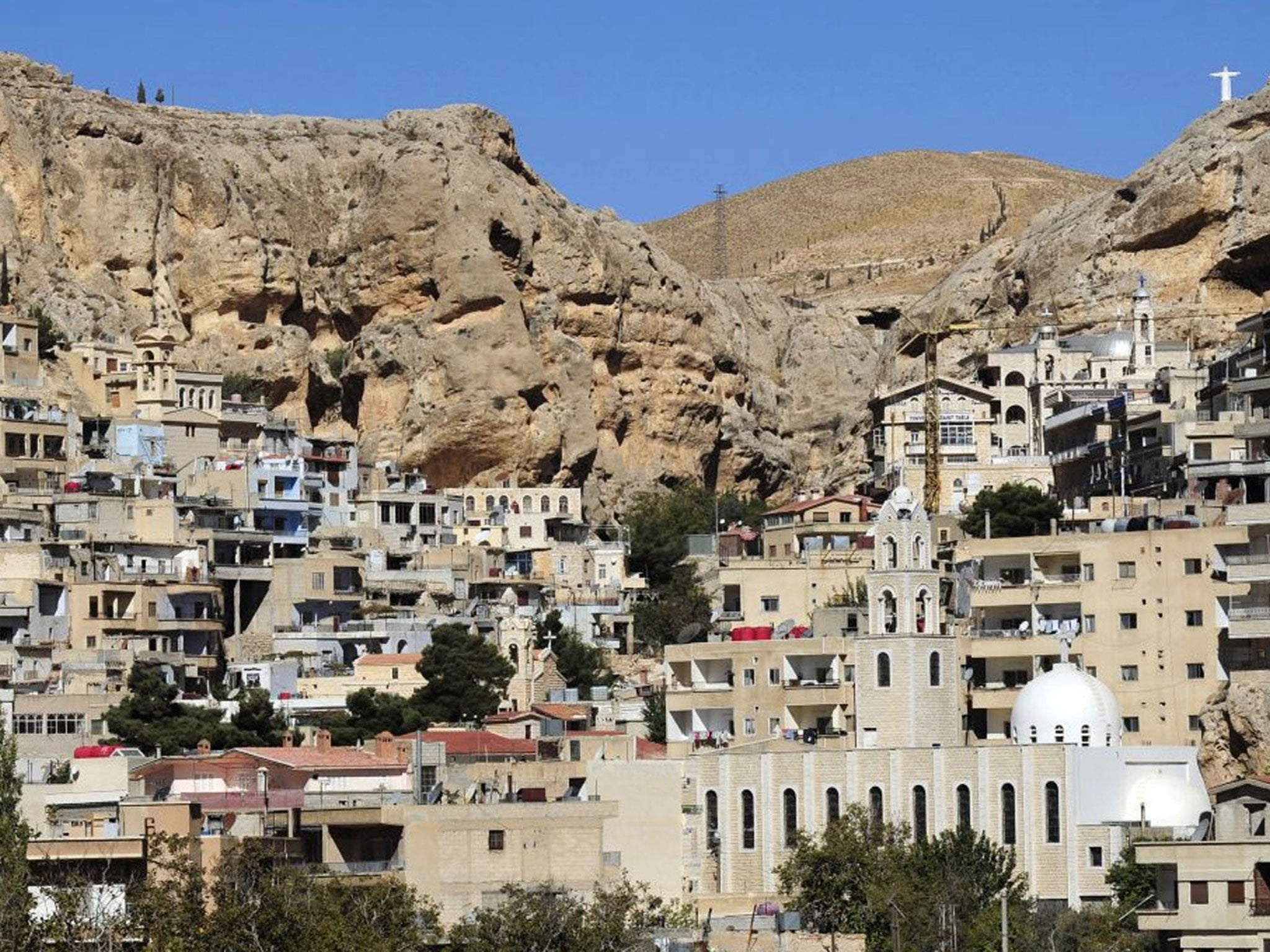War comes to Syria's quiet Christian hinterland
World View: A rebel attack on Maloula is a warning for a minority accused of supporting government


At the end of last year I visited the ancient Christian town of Maloula in a deep gorge in the mountains 20 miles north-west of Damascus. It has been a place of refuge for 2,000 years, its cliffs riddled with caves and its buildings clinging to towering walls of rock. It is one of the few towns in Syria where Christians are a majority and the only place where Western Aramaic, the language of Jesus, is still spoken.
People in Maloula were nervous when I was there, wondering just how long they would remain immune or at least largely unaffected by the violence that had engulfed the rest of Syria. Already, they were feeling its impact, mostly in the shape of criminal attacks on well-off Christians.
Maloula's uncertain immunity from the civil war in Syria lasted for another nine months. But, at 5.40am last Wednesday, a suicide bomber in a vehicle packed with explosives blew himself up at the checkpoint, killing some eight soldiers. Then, 20 pick-up trucks with machine guns mounted in the back stormed into the town, firing into the air. They took over an ugly white-washed hotel on top of a cliff as their command post and told people to stay in their houses. There was no resistance and fighting only started when the Syrian army arrived later in the day, government aircraft bombed and the rebels finally retreated. Heavy fighting around Maloula was reported yesterday.
What happened during the capture of Maloula is revealed in convincing detail by Matthew Barber in the online newsletter Syria Comment. He has rapidly combined film and statements by the insurgents with phone interviews with local people. The result is that, unlike most episodes in the Syrian war, it is possible to follow events with a fair degree of accuracy.
Going by their own declarations, the rebel units were mostly from jihadi groups led by the al-Qa'ida-linked Jabhat al-Nusra and including the Ahrar al-Sham, the Baba Amr brigade and the Free Syrian Army (FSA) commando unit. Local people say they were aided by Sunni Muslim refugees from the militant town of Douma on the outskirts of Damascus.
This is not a story of sectarian bloodbath, but the Christians in Maloula must have worried that it could turn into one. One rebel group called the operation a case of "an eye for an eye" in retaliation for the poison gas attack on rebel-held Ghouta on 21 August. There are postings with quotes from the Koran saying "Allah give us patience and victory over the infidel". Pictures taken by the insurgents show the bodies of Syrian army soldiers killed by the suicide bomber. The insurgent fighters finally retreated, but not before they had demonstrated that they considered Maloula a stronghold of government supporters. As with other such clashes, the government sent aircraft to bomb rebel positions, a tactic that has done so much to turn millions of Syrians into refugees inside and outside the country.
The occupation of Maloula illuminates other developments in Syria that differ markedly from what is being reported by the media or said by the Obama administration in an attempt to win Congressional assent for air strikes. On 5 September, the very day the al-Nusra stormed Maloula, the US Secretary of State, John Kerry, told a Congressional hearing about the rebels: "I just don't agree that a majority are al-Qa'ida and the bad guys. That's not true. There are about 70,000 to 100,000 oppositionists... Maybe 15 per cent to 25 per cent might be in one group or another who are what we would deem to be bad guys." Rebel commanders have been happily assuring American newspaper columnists that the supposedly moderate FSA is dominant around Damascus, unlike northern and eastern Syria.
The attack on Maloula is evidence of another aspect of the war: after its successes in the early summer in the battle for Qusayr, government forces have not been as successful on the battlefront as many expected. They have made some advances in Homs but still do not hold the whole city. If they did use poison gas against rebel-held suburbs in Damascus it may have been frustration at the army's inability to capture them by other means and its lack of manpower to sustain the casualties inevitable in street fighting. Maloula is not far from the main Damascus-Homs road, emphasising that this crucial highway could be cut by the insurgents if they are prepared to take the losses.
Maloula used to be one of the safer places in Syria for Christians, who once made up 10 per cent of the population. Many have already fled from Aleppo and northern Syria. Their priests and bishops have been kidnapped and murdered. In their part of the Old City of Damascus they are under mortar fire from rebel districts leaving no doubt that they are being punished as government supporters. Those with money have mostly left the country. Even a previously secure place in the mountains such as Maloula, where persecuted Christians once sought refuge, is safe no longer.
Suppose US missile strikes take place, will they tip the military balance decisively towards the insurgents? It looks unlikely, though elimination of the Syrian air force would enable the rebels to gain ground. The stalemate will continue. Syria has a failed government and a failed opposition. Both still think they can win if they get enough outside support but have few ideas other than to fight on. The only good news here is that government and rebels have become so much the dependent proxies of foreign powers that the US and Russia could force them to negotiate at least a ceasefire. But this may come too late for Maloula.

Join our commenting forum
Join thought-provoking conversations, follow other Independent readers and see their replies